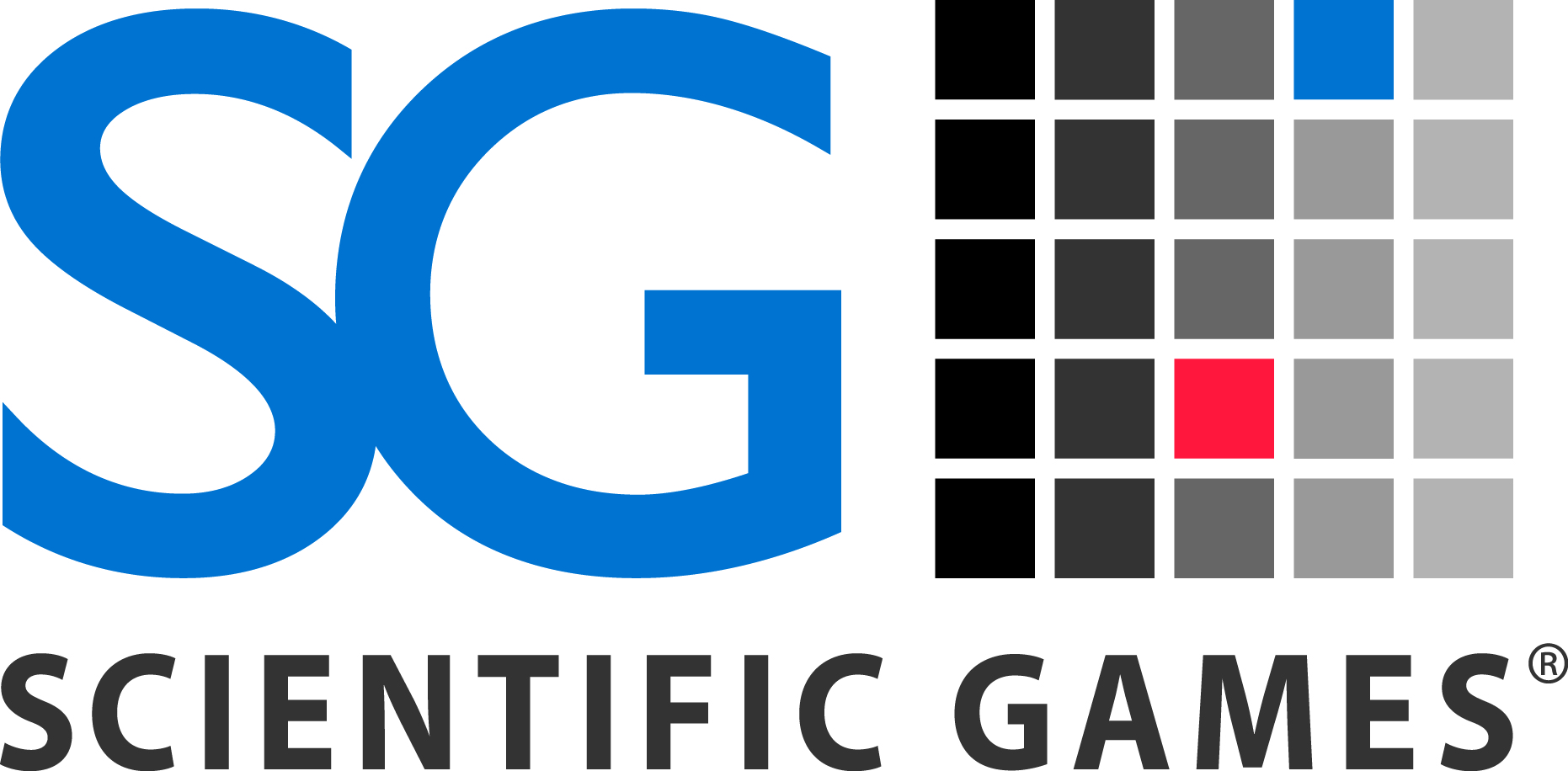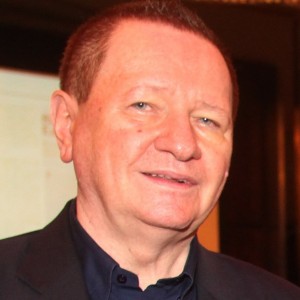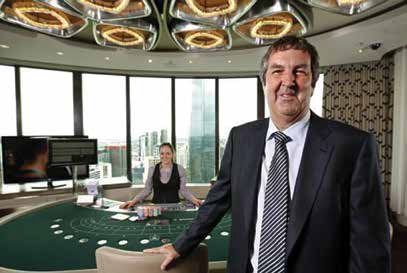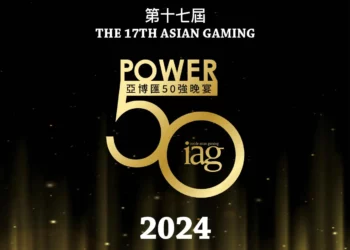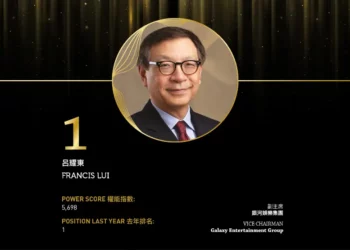21 Chen Lip Keong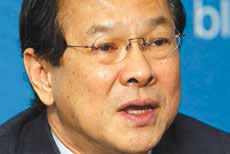
CEO and Executive Director
NagaCorp
Chen Lip Keong likes to tell the story of buying himself a flashy car when he got his first taste of wealth. But Dr Chen—a Malaysian citizen who trained as a physician—soon traded it in for a Proton, Malaysia’s no-frills national car. He wanted his achievements, not his ride, to do the talking, and NagaCorp speaks volumes.
Twenty years after taking its first bets on a barge on a branch of the Mekong, NagaCorp is poised to become a world class integrated resort operator on an international scale. It’s been a world class investment since its listing on the Hong Kong stock market in 2006—and Dr Chen, NagaCorp’s CEO and executive director, owns 41.7% of it. That $95 million IPO provided a shot of capital to complete the first phase of NagaWorld, now grown into Indochina’s largest gaming complex with 262 tables, 1,600 machines, 700 fivestar rooms and 18 food and beverage outlets.
The Hong Kong listing, bringing aboard former FBI agent Timothy McNally as NagaCorp’s chairman and instituting its own internationally monitored anti-money laundering procedures while Cambodia had no national rules highlight Naga’s efforts to impose global business standards on a frontier market. As an economic advisor to Cambodia’s long-serving Prime Minister Hun Sen, Dr Chen tries to make Naga a partner in Cambodia’s economic development, including creating a hospitality training center that places graduates in jobs with Naga and others. Naga has also pitched in everywhere from football sponsorships to police uniforms.
Cambodia has been generous to Naga, too. A 70-year gaming license to 2065 with a 40-year exclusive in Phnom Penh let NagaCorp establish a solid base, initially focused on mass market and lowlevel VIPs from Southeast Asian markets where casinos are illegal or severely restricted, notably neighboring Thailand and Vietnam. Chen Lip Keong CEO and Executive Director NagaCorp September 2015 inside asian gaming 33 34 inside asian gaming September 2015 Naga’s tax rate is negligible, though it paid a supplementary $9.4 million tax assessment this year, part of playing for the long haul. That’s helped put Naga in a sweet spot in the current regional gaming environment. “Still gaga for Naga,” Union Gaming declared earlier this year.
While Macau numbers tanked, Naga’s gross gaming revenue last year grew 17% year on year to $381.4 million and 42% in the first half of this year to $255 million. EBITDA last year was up marginally to $176 million, and in the first half rose 53% to $132.8 million. What’s behind the numbers bodes well for continued growth.
Enabling cash verification for mass tables means players need not visit the cage to play baccarat with $100 minimums for “squeeze games,” where players can touch the cards. Ongoing introduction of TITO (ticket in-ticket out) technology helped more than double first half machine revenue to $92 million. Naga received a $40 million “negotiating fee” from a contractor to run 300 EGM positions in May, indicative of its strength in that segment, setting the bar high for its other revenue share partners.
At the same time, Naga is shifting focus to take advantage of VIP opportunities. It’s built new VIP rooms and posh suites aimed at Macau junkets, luring market leader Suncity and others, though ramp ups have gone slowly. Naga is also moving into mainland China’s mass market, using a pair of Airbus A320 jets it purchased and leases to affiliate Bassaka Air. Working with China International Travel Service, Bassaka has instituted twice weekly service to Changsha, a Tier 2 city in Hunan province, for two-night-stay packages at NagaWorld. Service is expected to expand soon to thrice weekly and extend to Xian in Shaanxi province.
Naga is in a uniquely favorable position with regards its China business. Union Gaming estimates 20% of Naga’s gaming revenue comes from mainland Chinese customers, so it’s largely insulated from the negatives plaguing Macau operators. Yet Naga is also poised to penetrate the mainland market as opportunities arise.
On the horizon, Naga2 and NagaCity Walk provide further ammunition for an assault on the China market, as well as boosting business from Naga’s core markets. NagaCity Walk, to be operated by China Duty Free Group, is expected to open in the third quarter of next year. The retail mall, designed by Steelman Partners, will connect NagaWorld to $369 million Naga2, a 110,000-square-meter (1.2 million square foot) IR that should be competitive regionally, if not globally. Naga2, which the company says is on schedule to open in late 2017, will add up to 300 tables, 500 machines, 37 VIP salons, 1,000 guest rooms, many of them VIP suites including tables, a 2,100-seat theater and meeting space.
Then there’s Russia, where Naga broke ground in May on a $350 million resort in Vladivostok’s Primorsky Integrated Entertainment Zone, attracting domestic and international casino investors. Union Gaming estimates the first phase, to open in 2018, will cost $150 million, have 400 rooms, 100-150 tables and 400 EGMs, plus retail, meeting and entertainment components. Vladivostok is an opportunity in Naga’s wheelhouse as a frontier market, and it may sell more shares to finance the project. Naga also is a bidder for one of South Korea’s casino licenses, indicating that Dr Chen thinks Naga is ready for more conventional markets, and it could become a contender for a regional casino in Japan.
“We’ve been a work in progress,” Chairman Timothy McNally says. “But we’ve arrived.” And today’s Naga is no Proton.
22 Nicholas Niglio
Executive Director and CEO
Neptune Group
VIP baccarat’s share of Macau’s gross gaming revenue hit a peak of 74% in the third quarter of 2011, but has declined steadily since then.
Last month, it accounted for 52% of reported revenue. However, owing to the move by casinos to reclassify a good chunk of their premium-mass business as VIP following the total smoking ban on all Macau main-floor gaming areas in October, a truer adjusted estimate of VIP’s current share of total revenue is around 46%. So the mass market now—as of Q3 2015—outweighs the VIP segment, something that just three years ago seemed unlikely to happen this side of 2030.
While Macau’s junket operators—who supply the city’s casinos with the vast majority of their VIP players—have been reeling under the sector’s slowdown, it’s the smaller ones that appear to be hurting most, while the larger ones, including Top 3-ranked Neptune Group, are likely to weather the storm. Though pessimism prevails on expectations of the junkets ever returning to their former glory—as Las Vegas Sands Corp’s Rob Goldstein noted, “I hope the junkets resurrect, but right now it doesn’t look promising”—it’s early days yet in Macau’s evolution, and the junkets could yet find renewed vigor, most likely via diversification.
The eight years in which Nicholas Niglio’s been in charge at Neptune have seen the company grow not only in size but in scale. In addition to a comprehensive range of travel and hospitality services September 2015 inside asian gaming 35 it provides its VIP clients, Neptune has begun to exert a sizable impact on the bigger picture, notably launching two of the flashiest highstakes poker tournaments in the world.
Mr Niglio’s presence as the only nonChinese member of the board of directors of Neptune Group speaks volumes to the esteem in which he is held in Macau and Hong Kong by players, operators and investors.
With three decades of experience on two continents to his credit, Mr Niglio is charged with heading Neptune’s strategy of “continued controlled growth”. He was schooled in the hyper-competitive world of Atlantic City gambling in its heyday, joining Resorts International in administration in 1978 and moving into casino marketing. He served as vice president of casino operations at Caesars, the city’s preeminent high-roller venue of the time, and was senior vice president of Eastern Operations before moving to the Trump casinos in the early ’90s, where at various times over an eightyear career he headed up every facet of domestic and international marketing.
Mr Niglio joined Neptune as an executive director in September 2007, shortly after the listed entity was created out of an existing Hong Kong-listed company called Massive Resources International Corp., which previously traded electrical equipment and securities. Neptune thus became the first Macau junket operator to gain access to Hong Kong’s stock market via a backdoor listing, a trend that picked up this year with First Natural Food Holdings’ HK$400 million (US$51 million) investment in Hengsheng Group in March and Macau junketeer Jack Lam’s purchase, along with two British Virgin Islands entities, of 66% of Sinogreen Energy International Group for HK$113.8 million, setting the stage for the listed company’s absorption of part of Mr Lam’s Jimei Group.
23 Rowen Craigie
Management Director and CEO
Crown Resorts
James Packer’s decision to step down as chairman of Crown Resorts to focus on the billions the company has on the table in planned resorts in Macau, Las Vegas and Sydney will likely free up his second-in-command, Rowen Craigie, to concentrate on maintaining Crown’s position as Australia’s premier gaming operator.
That won’t be easy, with a rejuvenated Echo Entertainment on his heels, but the industry veteran has a decade of success Down Under to his credit and a couple of marquee destinations to work with in Melbourne and Perth, both of which have been significantly enhanced over the last few years and will only get better in the next few.
The latest financial year saw the downturn in Macau take a big bite out of the value of the company’s 34% stake in Melco Crown Entertainment. This wasn’t unexpected. It was fairly severe, nonetheless—a 44.6% decline in Crown’s share of MCE’s adjusted net profit. Charges related to the company’s stake in US gaming operator Cannery Resorts, combined with the write-off of its abortive resort plans in Sri Lanka, subtracted another A$61.3 million. In all, the bottom line corporate-wide was down an adjusted 17.9%.
On top of this, and perhaps much to Crown’s surprise, the company lost out to Echo in the bidding for a $1 billion resort in Brisbane.
None of this has done wonders for Crown’s ASX-listed stock, which has been trading at or near 52-week lows, and the investment community has been making noises about leverage. Corporate net debt stood at $2.46 billion as of 30th June, most of it, of course, stemming from Mr Packer’s global ambitions.
Which is where Mr Craigie comes in. The company must continue to deliver operationally at home. And, to date, it has.
It was a $3.2 billion year for Crown Melbourne and Crown Perth, and in this respect, Macau’s travails have been anything but a complete loss. FY2015 saw VIP turnover at the two resorts surge 41.8% year on year to generate a combined $955.9 million in revenue. The take on the main floors overcame softness in Western Australia’s resource-driven economy to register a creditable 5.5% increase to $1.59 billion. Melbourne’s adjusted EBITDA surpassed 2014’s by 17.8%, Perth’s by 5.3%.
Mr Craigie and his executive team have no intention of running in place either. More than $100 million in reinvestment is slated for Crown Melbourne next year, another $328 million at Crown Perth. The room product and non-gaming offering at WA’s only full-scale casino have been revamped top to bottom. A third luxury hotel is under construction there and is scheduled to open next December with 500 six-star rooms, more high-end restaurants and MICE facilities and more VIP gaming space. A fourth hotel is planned for Crown Melbourne, a five-star affair with a complement of luxury apartments.
And with ground set to be broken this year on the US$2.8 billion Alon on the Las Vegas Strip, and planning moving ahead for the $2 billion Crown Sydney, the company’s first foray into Australia’s largest city, and MCE’s Studio City getting ready to open the doors this fall, it is certain that Mr Packer will be leaning more heavily than ever on his No. 2’s experience and advice.
Mr Craigie has played an integral role in the Packer family’s casino fortunes going on a quarter-century. Kerry Packer recruited him from the state of Victoria’s TAB in 1993 to head his machine gaming operations. By 2002, he’d risen to chief executive of Crown Melbourne Limited, as the company was known at the time, and of Burswood Limited, Crown Perth’s predecessor. He also served on the board of Consolidated Media Holdings, the television and newspaper company on which the Packer empire was built. Since the presentday Crown was formed in 2007, he has been its only CEO.
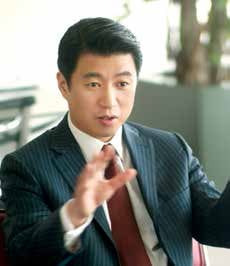
24 Philip Chun
Chairman and CEO
Paradise Group
South Korea’s 16 foreigner-only casinos are fast becoming an anachronism in a continent increasingly replete with the latest and greatest destination-scale gaming resorts.
The largest and best-known currently operating foreigners-only casino was opened in 1968 by Paradise Group at the Sheraton Walker Hill Hotel in the capital, Seoul, one year after the sector was legalized. It’s got 79 tables, twice the average among its peers.
In 2014, foreigners-only casinos generated about 1.4 trillion won (US$1.2 billion) in gaming revenue, essentially flat from the year before. To emphasize the sector’s modest size and its potential for growth, observers contrast that figure with Macau’s casino revenue, which last year was 36 times greater, at $43.9 billion. It’s a sensationalistic comparison, but there is perhaps some merit in making it because the two markets aren’t as different as they appear at first glance.
Macau’s casinos, though technically permitted to serve locals, derive a virtually insignificant proportion of their revenue from them. The bulk of the take at both Macau’s casinos and Korea’s foreignersonly venues is supplied by players from mainland China. The split between VIP and mass market is also fairly similar across the two markets. There’s a big difference in capacity, though, with about 620 gaming tables across Korea’s foreigner-only sector, versus 5,700 tables in Macau, making a pound-for-pound comparison between the two markets more meaningful than a top-line revenue comparison: the average Macau table generated $7.7 million last year, close to four times the yield of the average Korean foreigner-only table, which made $2 million.
The two markets have different catchment areas, but that doesn’t seem to explain the gap. Macau, situated on China’s affluent southern coast, benefits from its proximity to the wealthy residents of Guangdong province. South Korea’s foreigner-only casinos, meanwhile, enjoy an exclusive position in northeast Asia, providing the closest legal gaming tables to not only wealthy northern Chinese, including residents of Beijing and Shanghai, but also to Japanese. There is arguably sufficient demand in Korea’s neighborhood to support a casino industry with a capacity close to that of Macau’s, even if the ban on domestic play remains in place.
The reason an average table yields so much more in Macau than in Korea is the two markets don’t offer comparable products. Over the past decade, lavishly appointed resorts unveiled in Macau, Singapore and, most recently, the Philippines, have drastically altered regional gamblers’ expectations of a casino experience. As JP Morgan analyst DS Kim puts it, Korea currently lacks “‘real casinos’—that are of comparable scale and quality and have similar offerings as those in other markets—to appeal as a destination to gamblers in the region.”
The Korean government first resolved to address this shortfall back in 2011 with plans to approve the development of a number of integrated resorts with foreigners-only casinos. The first project to get the go-ahead was a joint venture between Paradise Group, the country’s leading foreigners-only casino operator, and Japanese September 2015 inside asian gaming 37 gaming machine manufacturer Sega Sammy Holdings. The resort, dubbed Paradise City, is located in a special economic development zone on Yeongjong island, the site of Incheon International Airport, the main gateway for foreign arrivals, located about 30 kilometers from Seoul. Groundbreaking took place in November with an anticipated 2017 opening at an initial cost of US$750 million.
Paradise Chairman and CEO Phil-lip Chun, the son of the company’s founder who took the reins from his father in 2005, is confident Paradise City will stand out among the crowd. “Paradise will differentiate from new foreign players with ‘Korean-ness,’” he says, expecting to capitalize on hallyu, the Korean pop culture trend sweeping Asia. “The main content Paradise will be showing to our guests will be Korean culture such as K-pop and other entertainment content.”
Korea’s foreigners-only casino market will remain constrained ahead of the new integrated resorts coming online from 2017 onwards. Even then, skeptics such as Seoul-based gaming analyst Steve Park at Kore Company argue the country’s new “mini-IRs” will prove too small to compete regionally. Paradise City, with its initial complement of 160 gaming tables, 388 electronic table games and 350 slot machines, will become by far the country’s largest foreigners-only casino come 2017, but will hardly measure up to the IRs in Macau and Singapore.
There are several bulls, however, including Standard Chartered analyst Philip Tulk, who believes IRs in Incheon will produce a cluster attractive to foreign visitors. A second project already approved on Yeongjong is a similarly priced joint venture led by US casino operator Caesars Entertainment, which plans to break ground this year and open in 2018. Two other ventures could join the cluster come 2019, with a Request for Proposals process having started last month for two additional foreigners-only IR licenses, after the concept phase drew 34 applicants.
There’s also a chance they could all morph into more than miniIRs. At final build-out, most of the proposed Incheon projects have investment targets in the billions of dollars, though clearly, it remains to be seen whether any of them are realized. Even Paradise City envisions doubling its investment in its second phase.
Paradise’s five casinos, in Seoul, Incheon, Busan and the two in Jeju, achieved a 47.4% share of the country’s foreigners-only casino market in the second quarter with gaming revenue of 143 billion won ($120 million), down 17.1% from a year earlier as the outbreak of Middle East Respiratory Syndrome in South Korea kept tourists at bay and Chinese VIP play was impacted by Beijing’s ongoing corruption crackdown. Gross profit was down 37% to KW30.3 billion.
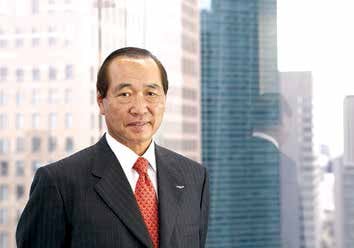
25 Hajime Satomi
Chairman, President and CEO
Sega Sammy Holdings
As Japan’s push to legalize casinos inches closer to realization, SEGA SAMMY HOLDINGS is positioning itself as a frontrunner to secure one of the gaming licenses that could soon be on offer.
In a bid to cut its teeth in casino resort development and operation, the Japanese pachinko manufacturing giant will break ground next month on the first phase of a highly touted destination resort with gaming it is developing in South Korea with that country’s Paradise Group on Yeongjong Island, a special economic zone located near the port city of Incheon and the country’s main international airport.
A 2017 opening is planned for the US$1.7 billion Paradise City, as it’s known, and plans are to capitalize on China’s booming market in outbound tourism with a hotel, a casino with 120 table games and 700 slots and electronic gaming machines and an array of nongaming attractions, including retail shopping, entertainment and MICE facilities.
SEGA SAMMY stated a desire as far back as 2007 to invest in casinos in Japan should the opportunity arise, and in 2012 purchased a resort in Miyazaki Prefecture. Two months after that acquisition was announced, Chairman Hajime Satomi reasserted the company’s intentions, saying, “Of course, [a casino] is what we have in mind.” SEGA SAMMY expects to generate 157 billion yen (US$1.5 billion) in total revenue in the six months ending 30th September. Although it already ranks as one of Japan’s biggest companies based on recurring income, a casino license would propel it much higher.
SEGA SAMMY was created in 2004 when Sammy Corporation bought a controlling interest in ailing video game giant Sega. The 72-year-old Mr Satomi, who heads the combined group, founded Sammy in 1975 and built it into one of the biggest suppliers of pachinko and pachislot machines in Japan (its major rival in the market is Sankyo Corporation). In the current fiscal year ending 31st March 2015, Sammy expects to sell 250,000 pachinko machines and 374,000 pachislots. The company is also developing innovative games for the casino industry through its subsidiary SEGA SAMMY CREAT ION. The first of these—splashy, outsized, carnival-style takes on baccarat, sic bo and big wheel—were unveiled last year, with the sic bo game having gone on to be installed at The Venetian Macao.
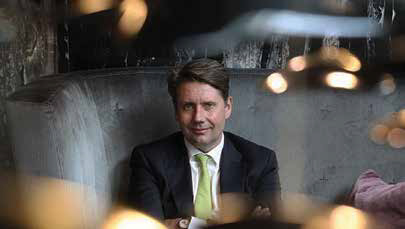
26 Matt Bekier
CEO and Managing Director
Echo Entertainment
Matt Bekier took the boss’ chair at Echo Entertainment two months before good things started to happen for Australia’s second largest casino operator.
Mr Bekier took over as CEO last April after serving as Tabcorp’s chief financial officer and assuming the same role at Echo when the betting giant spun off its casinos in Sydney, Brisbane and Gold Coast in 2011. Seen initially as a safe choice for the job, he’s brought a fresh energy and confidence to a company sorely in need of it. When he took over, Echo already knew that come 2019 it would be losing its Sydney monopoly at The Star to rival Crown Resorts. It would shortly be facing the prospect of major new competition as well in Gold Coast, its other key market, from an IR proposal the government of Queensland would approve for the popular holiday spot.
Then, last June, Echo leapt to the offensive, securing a partnership with Hong Kong multinationals Chow Tai Fook Enterprises and Far East Consortium that would turn back Crown’s assault on its exclusive license in Brisbane and win for the new joint venture the right to develop a A$1 billion integrated resort with a casino in the Queensland capital.
The victory may prove key to Echo’s ability to hold its own as competition heats up Down Under for the burgeoning Chinese tourist market. It is, moreover, Echo’s first greenfield development, and Mr Bekier & Co. are eager to show what they can do.
Plans call for an expansive, all-inclusive destination that will serve as the catalyst for the revitalization of the city’s central Queen’s Wharf district with parklands and public event space the size of 12 football fields and accessible via a new bridge over the Brisbane River that will integrate the resort with 2,000 new apartments, sports facilities and a variety of heritage sites. There will be 50 fine dining and casual restaurants and cafes and several theaters and showrooms in the resort core. Ritz-Carlton and Rosewood will be lending their brands to two of five hotels, 1,100 rooms and suites in all, clustered around an architectural centerpiece known as the Arc, which will feature an observation deck and rooftop cinema, an Infinity pool overlooking the river, an upscale events venue and a casino.
Some 2,000 jobs will be created in the construction phase, which is scheduled to begin in 2017. More than 8,000 people will be employed when the resort opens in 2022.
To herald its arrival Mr Bekier has embarked on a new, unified brand strategy for the company, which will be changing its name later this year to The Star Entertainment Group.
Revenue and earnings have improved significantly in his first year at the helm, and the company is moving full speed ahead on a $345 million expansion and remodeling of Jupiters Hotel & Casino Gold Coast, soon to be known as The Star, Gold Coast.
“We have created stability and momentum in the business,” he said, “and are embarking on significant capital works programs at all our properties to ensure that as a group we will own and operate truly world-class integrated resorts.”
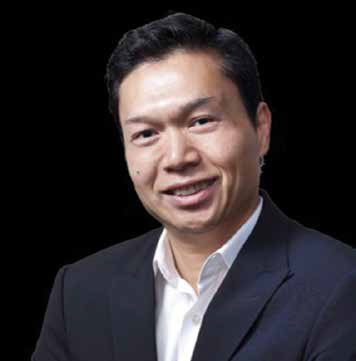
27 Clarence Chung
Chairman and President
Melco Crown Philippines
Chairman and CEO
Entertainment Gaming Asia
Clarence Chung has been a busy man since Melco Crown Entertainment’s US$1.3 billion City of Dreams Manila debuted in February as the second mega-resort to set up shop at the Philippine government’s Entertainment City tourist district on Manila Bay.
His ramp-up of the expansive 940-room casino hotel complex—a joint venture between Melco Crown and Philippine property giant Belle Corp.—has taken it down something of a different path than originally envisioned as it focuses on the domestic mass and premium-mass markets for its 365 table games and 3,560 machine games while waiting for its Macau-based parent to deliver the VIPs. PSX-listed Melco Crown (Philippines) Resorts is taking it on the chin in the meantime, incurring losses through the first half of PHP4.91 billion (US$105 million). But junket operations were finally launched in July, and management is looking ahead to a strong second half.
As for his other job running Entertainment Gaming Asia, the Nasdaq-traded company responsible for much of Lawrence Ho’s Southeast Asia operations, Mr Chung has been working to achieve a turnaround. It began in the spring when EGT, as it’s known, engineered a 1-for-4 reverse stock split to regain compliance with Nasdaq listing rules. From there it motored into the second quarter with a reversal of last year’s net loss in favor of $1.5 million in profit on a 54% surge in consolidated revenues, most of it driven by a strong performance from the company’s Dreamworld Poipet casino on Cambodia’s border with Thailand.
EGT, which is 38% owned by Mr Ho’s Melco International Development, also enjoys income streams from machine games it supplies on a revenue-sharing basis—major clients currently include the NagaWorld monopoly in Phnom Penh, Cambodia’s largest casino, and the country’s Thansur Bokor Highland Resort, located in a tourist enclave in Kampot province—and from casino currency sales. The latter, marketed under the Dolphin brand, are growing impressively, generating sales good for $2.7 million in the second quarter, handily surpassing the $524,000 realized in Q2 2014, and looking forward to $4.5 million more in the second half and another $6 million next year.
With $24 million in cash on the company’s books, Mr Chung is making no secret of his determination to build EGT bigger. When the second-quarter numbers came in, he said, “We believe we have greatly improved our ability to secure new projects that could enhance our existing operations and provide the opportunity to expand into new businesses and markets.”
An accountant by training, he joined Melco in 2003 as chief financial officer after serving as an investment banker and vice president of Hong Kong’s Pacific Century Group. He is an executive director of Melco International and also sits on the board of Melco Crown.
28 Thomas Arasi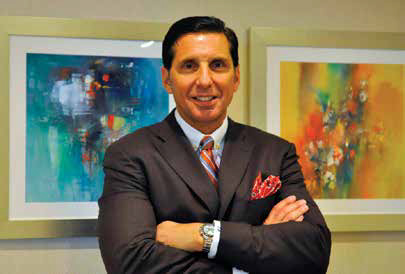
President and CEO
Solaire Resort & Casino
When Thomas Arasi arrived at Manila’s Solaire Resort and Casino two years ago, he seemed tailor made for the assignment. Philippine billionaire Enrique Razon had built a splendid property but needed someone to put the business end of it in order. Mr Arasi, a hospitality business veteran on the numbers side, had delivered a record opening quarter as CEO at Singapore’s Marina Bay Sands.
True to his bean-counter roots, Mr Arasi instituted cost cuts at Solaire, made the operation more efficient and reshaped marketing with a pan-Asian strategy similar to what succeeded in Singapore. With a steadily growing Philippine economy at its back, Solaire’s EBITDA increased from P1.1 billion ($26 million) for 280 operating days in 2013 to P10.1 billion for a full 2014. Gaming revenue more than doubled to P30.4 billion, and EBITDA margins increased from 9% to 42%. In the first half of this year, Solaire soundly passed crosstown rival Resorts World Manila as the market’s gaming leader with revenue of P15.6 billion. That’s what you’d expect from a numbers guy.
But Mr Arasi has shown that he’s much more than a clever bookkeeper. He’s become a key figure in parent company Bloomberry Resorts’ brain trust, holding the corporate president and chief operating officer titles. He has been involved in Bloomberry’s expansion into South Korea, where it’s bidding for a gaming license in Incheon to build a seaside integrated resort and bought a casino hotel on Jeju island. At last year’s Japan Gaming Congress in Tokyo, Mr Arasi wowed attendees with a presentation in Japanese, which he picked up when he’d done mergers and acquisitions there. If and when there’s an opportunity for gaming licenses in Japan, expect Mr Arasi to play a big role.
Solaire’s Sky Tower addition was well underway when he arrived, but Mr Arasi oversaw design changes to enhance $1.2 billion Solaire’s positioning as a boutique luxury destination. Despite the changes, Sky Tower opened “on track and on spec,” Mr Razon noted, last November to rave reviews. The new wing’s 312 suites brought Solaire’s room count to 800, added 66 VIP tables in 10 contemporary salons with dedicated F&B outlets, plus a Broadway-style theater, luxury spa and other non-gaming amenities. A nightclub and retail mall will open in the months ahead. Sky Tower has made Solaire 40 inside asian gaming September 2015 a true integrated resort and put it on the regional map. Mr Arasi believes that, pound for pound, it can take on any IR in the region.
“Famous Filipino hospitality is our secret sauce,” Mr Arasi says, focusing on service as a major advantage for Manila over other gaming destinations. He’s shown himself adept at people skills as well, a knack honed at Marina Bay Sands, where baristas still remember his double-shot soy latte order. For a company-wide pep rally on the eve of Sky Tower’s debut, Mr Arasi traded his usual threepiece suit and crisply starched white shirt for jeans and a golf shirt in Solaire’s signature orange. Part Steve Jobs, part gospel preacher, Mr Arasi told employees in a country known for exporting service workers, “Making it big won’t require going any further than where we are right now. We’ll make our dreams come true in this crown jewel we call Solaire.”
On the financial side, the dream is not unfolding quite as planned. Despite securing the market lead in gaming revenue, Solaire’s first half EBITDA declined 20% to P3.6 billion and it reported losses for both quarters. Solaire blames accounting change accompanying the opening of Sky Tower, changing its financing costs from capital to current expenses. But Morgan Stanley Asia notes that operating expenses at Solaire remain higher than the competition at P31 million a day. It’s time for Tom Arasi, numbers guy, to sharpen his pencil.
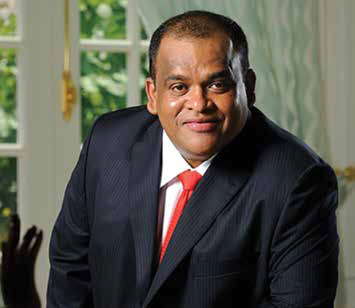
29 Dhammika Perera
Chairman and Managing Director
Vallibel One
High hopes for Sri Lanka’s casino industry at the end of last year were dashed following the surprise result of the 8th January presidential election, which saw Mahinda Rajapaksa defeated by Mithripala Sirisena, who previously had served as Mr Rajapaksa’s health minister before quitting abruptly to run against him just two months before the vote.
Mr Rajapaksa, who governed the country virtually unopposed for 10 years, supported gaming expansion as a means of boosting the island nation’s economy through increased tourism and foreign investment. However, the plan was never popular with influential religious leaders of the country’s Buddhist-Sinhalese majority and was criticized heavily both by opposition parties and segments of Mr Rajapaksa’s own coalition partners, who feared the industry would undermine traditional values and lead to a variety of social ills.
Among Mr Sirisena’s campaign promises was the cancellation of the previous administration’s approval of casinos at three resorts planned for the capital of Colombo—a promise he fulfilled immediately after coming to power. The casinos canceled include one slated for a US$400 million resort planned by Australia’s Crown Resorts in the capital’s popular tourist core, prompting Crown to scrap the entire project. Casinos are also gone from a $300 million resort proposal called Queensbury, backed by local company Vallibel One, which owns three of Sri Lanka’s four existing officially sanctioned casinos, and an $850 million resort called Water Front Properties proposed by hospitality giant John Keells Holdings, the country’s largest publicly traded company.
The government dealt the industry a further blow in April, moving ahead with the imposition of a US$100 casino entry levy, which, unlike Singapore’s S$100 (US$70) levy, applies to foreigners as well as locals.
The handful of small casinos currently catering to the Colombo tourist trade only gained official recognition at the end of 2010, having operated for years before then as “recreation clubs” under a grayarea arrangement dating back to the British colonial era. The turning point was arguably the decisive end to a bloody 26-year-long civil war pitting the government against ethnic Hindu Tamils in the north of the country, in which Mr Rajapaksa was instrumental. That victory gave his government the mandate to pass legislation to formally recognize the industry through the registration of the casinos with the Inland Revenue Department for tax purposes. Four de facto casino licenses were thus established.
Dhammika Perera, by many accounts the country’s richest individual, is the biggest casino operator in Sri Lanka— though casinos account for only about 4% of the revenue of his holding company, Vallibel One. He owns three licensed gaming establishments. Raji Wijeratne, Crown Resorts’ intended local partner before it pulled out, owns the remaining license, which he has managed to split across two venues. All five casinos are located in Colombo, and the biggest, Mr Perera’s Bally’s, has 80 table games (his Bellagio has 40 and his MGM Colombo another 40).
Though small in size compared to the super-resorts of Macau and Las Vegas, Sri Lanka’s casinos are pleasantly decorated and well maintained and offer service on a par with international standards. Indians and Chinese are the main patrons, with Mr Perera claiming they each contribute about 40% of the revenue at his casinos. He told Inside Asian Gaming that locals are responsible for only about 4%, with the remainder generated by other foreigners.
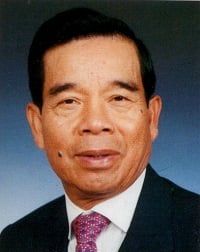
29 Cheng Yu Tung
Honorary Chairman
Chow Tai Fook Enterprises
In 1982, Cheng Yu Tung did Macau’s reigning casino king Stanley Ho a favor. Mr Ho had fallen out with one of the original four partners that formed Sociedade de Turismo e Diversoes de Macau and won the territory’s casino monopoly 20 years earlier. Mr Cheng, who married the daughter of Chow Tai Fook Jewelry’s founder and greatly expanded the company then founded Hong Kong’s New World Development, bought the partner’s 10% stake for HK$400 million ($51 million). The Hong Kong billionaire has tried to expand his family’s role in gaming since. During the past year, the Chengs finally began succeeding.
When Macau liberalized the casino business in 2001, New World partnered with then-MGM Mirage to bid for a concession. Consultant Arthur Andersen rated its application the best, but the government’s Tender Committee saw things differently. Last year, the family’s Hong Kong-listed International Entertainment reached an agreement to buy 70% of Suncity Group for HK$7.35 billion, which would have effectively made Macau’s largest junket promoter a listed company. Regulators apparently put the brakes on that deal, but industry insiders say the two groups remain close.
Last November, Chow Tai Fook Enterprises, the family’s privately held investment arm that controls the pieces of its estimated $11 billion empire, signed a letter of intent with the government of Incheon to build a $1.6 billion integrated resort in the city’s Incheon Free Economic Zone, near South Korea’s gateway airport, 50 kilometers (30 miles) from national capital Seoul. The IFEZ has two IRs under construction and is the focus of a request for proposals process that got underway last month for two additional foreignersonly casino licenses, after the concept phase drew 34 applicants. The growing throng of Chinese travelers to South Korea, numbering 6.1 million last year, is the main gaming target. South Korea’s decision on licenses is expected next year.
In March, Chow Tai Fook Enterprises emerged as a partner with Macau junket promoter Suncity Group in Vietnam’s long dormant Hoi An South integrated resort project. Local investment company VinaCapital first announced the project in 2010 with Malaysia’s Genting Group as a partner, but Genting pulled out two years later. Early this month, Chow Tai Fook upped its investment to take the lead role from VinaCapital, which will remain involved. Vietnam requires a $4 billion investment for IRs, but allows developers to meet that goal in phases. The first phase of Hoi An South, in Quang Nam province about 100 kilometers from the nearest international airport in Danang, is expected to cost $500 million and include a hotel, golf course and casino with about 90 tables, to open by early 2019.
Chow Tai Fook and Hong Kong-listed partner property developer Far East Consortium International Ltd joined Echo Entertainment to form Destination Brisbane as final contenders for the ambitious Queen’s Wharf Brisbane project. In July, Queensland’s government chose Destination Brisbane’s A$4 billion ($2.9 billion) proposal to remake a 9.3-hectare (23 acre) swath of the waterfront in Australia’s third largest city as an entertainment and leisure district. The project has to await relocation and demolition of government buildings on the site and isn’t expected to begin operating until 2022.
Preliminary terms of the Queen’s Wharf agreement indicate Echo will fund 50% of the C-shaped integrated resort’s twin towers and related amenities, with Chow Tai Fook and Far East paying 25% each. The minority partners will independently finance and develop 2,000 high-rise housing units on the site. Queen’s Wharf Brisbane will further utilize the breadth of Chow Tai Fook’s holdings and expertise, including offering it commissions on direct VIPs from its database of wealthy Chinese that spans its property development history, Chow Tai Fook Jewelry’s 1.7 million VIP program members in the mainland, Hong Kong and Macau, plus 4 million more of its New World Department Stores VIPs, not to mention guests of its Rosewood luxury hotels brand.
Perhaps more important, being approved as a casino investor in Australia could make authorities in South Korea, Vietnam and other destinations more amenable to Chow Tai Fook’s casino development ambitions.
Next: The Asian Gaming 50 – 2015: 31-40







